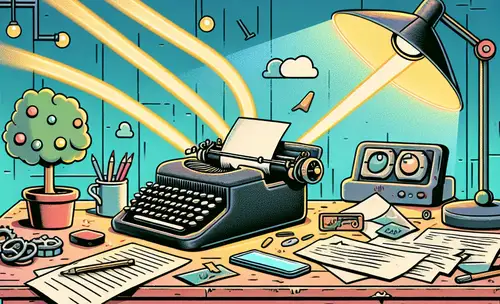Why Writers Are Still Needed in the Age of AI

Listen up, aspiring Hemingways and J.K. Rowlings! As we launch into this brave new world filled with intelligent machine-sidekicks featuring algorithms and language models that can whip up text faster than a caffeinated squirrel, a burning question looms: Is AI really going to take human writer jobs? Well, only if you consider your calculator a threat to your math skills!
AI is here to assist, not replace. Think of it as your eager sidekick—it can fetch ideas while you focus on crafting those brilliant plots and characters that will have readers swooning or laughing out loud.
So, why do we still need human writers, you ask? Let’s break it down like we’re chopping vegetables for a stir-fry. Get ready for a delightful dissection of why the writing profession isn't disappearing anytime soon!
The Heart and Soul of Storytelling
First off, let’s chat about what makes storytelling so magical. Anyone can spit out a sentence that says "Once upon a time." But can a robot wrap you up in the emotions of the characters, the tension of the plot, and the sheer unpredictability of life? Not quite. Those neural networks can go all out with syntax and grammar, but putting a genuine human experience into words? That's a whole different ball game.
Readers crave that connection—the kind that only an empathetic human has lived through (or, you know, at least Googled to some extent). Writers dig deep into the emotional aspects of life, weaving in nuances and sentiments that AI simply can’t replicate. Whether it’s the bittersweet pang of first love or the gut-wrenching loss of a dearly-beloved pet rock, humans bring something to the narrative that no algorithm can code.
Creativity: A Messy Business
AI may be great at generating content, but a creative writer embraces chaos. Ideas bloom in messy, wonderfully unpredictable environments—amidst crumpled drafts and donut crumbs (okay, maybe just the donut crumbs). The best inspiration often comes from unexpected sources: an overheard conversation, an awkward family dinner, or that time your cat decided to play acrobat on the bookshelf.
While AI can assist with brainstorming or suggesting plot twists, it doesn’t have real-life experiences, the spontaneity, or the wild uncertainty of living a human existence. Writers explore the downright absurdity that comes with being alive, capturing shadows and colors that remain elusive to our metallic companions.
Tone, Voice, and Humor
Now let’s dive into something more subtle—tone. Tone is a tricky and slippery concept, like trying to nail jelly to a wall. Different audiences respond to different styles, and that’s where writers shine. AI may regurgitate data with impressive speed, but can it sprinkle in the bit of sarcasm or heartfelt sincerity that grabs a reader’s attention? Unlikely, my friend.
The nuances of tone and voice come from understanding people, cultures, and quirks—essentially, the art of being human. Humans can read between the lines, play with irony, or craft laugh-out-loud moments that make you think, "Wow, I needed this giggle today." While AI can attempt humor, the spontaneous wit and laughs that real-life writers deliver is unmatched.
Editorial Decision-Making
Let’s not forget about the crucial role of editors—yep, those sharp-eyed wizards who can turn a good poem into a great one with a mere suggestion. AI might assist with proofreading, catching typos, and improving clarity, but editorial judgment is something it simply can’t execute on its own. Good editors read with a critical eye, asking, “Does this align with the emotional arc?” or “Have we seen this plot twist happen 12,000 times or should we go for something fresher?”
This decision-making is often intuitive, based on experience, knowledge, and gut feelings every writer has towards their work. This is the magic of human expertise that will forever remain irreplaceable.
Collaboration and Community
Writing isn't just a solitary act locked away in a tower (unless it's one of those dramatic, tortured artist scenarios). It’s often collaborative—think workshops, brainstorming sessions, or good old-fashioned coffee-fueled chats with fellow creatives. This vibrant exchange of ideas is where the real magic happens.
Sure, AI can offer suggestions or recommendations, but it simply cannot evaluate emotions, friendships, and the spark of human interaction involved in creative collaboration. Writers need that feedback bounce board that can only come from fellow humans—because, let’s face it, sometimes you need someone else to tell you that your character doesn’t actually need to talk to their cat about their existential crisis at 3 am.
Conclusion
In a world where technology evolves at breakneck speed, writers are very much here to stay. So, don’t fret; your job is not going extinct alongside typewriters or rollerblades. Rather, embrace the evolution, welcome AI as your eager sidekick, and let the digital wizard do the heavy lifting while you jazz up your creativity, emotion, and human connection.
Whether you're drafting an epic saga or jotting down your upcoming blockbuster rom-com about a lovesick robot, remember: it takes a human heart to truly connect with readers. And when it comes to storytelling, that’s a job no machine can ever take away.
So sharpen your pencils, rev up those laptops, and keep on writing—because the literary world still needs you.